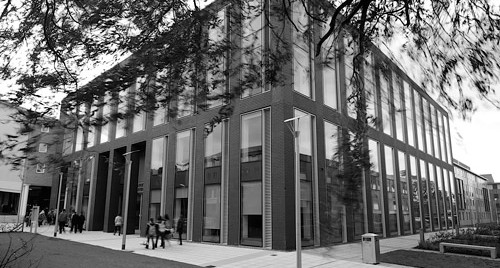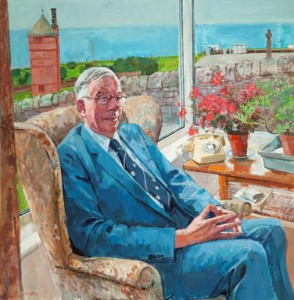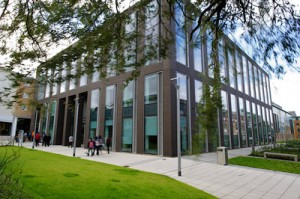
Charles Carter is an important figure in Lancaster’s recent history, having served as the University’s first Vice Chancellor from 1963-79. What many people may not know, however, is that, as a Quaker and pacifist, Carter refused to be conscripted into the armed forces during World War 2, a principled stand for which he served a short prison term. Although there is little in the public domain about this period in Carter’s life, Jacob Sanderson describes here the shaping influence of Carter’s life-long faith on his pacifist and progressive beliefs.
Sir Charles Carter: Quaker Progressivism and Pacifism Personified
Posted by Jacob Sanderson, Lancaster Royal Grammar School

Portrait of Charles Carter, by Trevor Stubley (Image reproduced courtesy of Lancaster University – www.lancaster.ac.uk)
Although born in Rugby in 1919, it is certainly in Lancashire, and more specifically Lancaster, that the legacy of Sir Charles Frederick Carter can be most easily seen. A man of character, intellect and conviction (in several senses of the word) he spent three months in Strangeways Prison as a conscientious objector during World War 2. Afterwards, he joined the Friends’ Relief Service and served from 1941 until 1945. Having earned a first in Mathematics and Economics from Cambridge, Carter returned there after the War to a lectureship in Statistics and in 1951 became professor of Applied Economics at Queen’s University Belfast (1952-1959). By 1963 he was in Lancaster, where he shaped the University in innumerable ways and is credited with laying the foundations of its future success. As founding Vice Chancellor from 1963 to 1979 he bore responsibility for virtually all aspects of the new establishment, ranging from curriculum to building, planning and finances. He retired in 1979 and was knighted shortly thereafter, continuing his involvement in public life by working for causes he deemed to be worthwhile.
Carter’s Quaker Beliefs
There can be no doubt that Carter’s Quakerism was one of the most important motivating factors in his remarkably staunch pacifism and progressivism, even in the face of official persecution for refusing the call to arms in the Second World War. As an economist he firmly believed in that most identifiably Quaker maxim that ‘wealth should be put to the service of those in greatest need’, as he laid out in one of his published writings, The Science of Wealth (1960). As a leading Quaker academic and public figure, he wrote regularly in the The Friend Quaker magazine on a variety of matters. The piece that I found to perhaps best represent Carter comes from 1944 where he writes on ‘Making Old Folks At Home’. Carter says: ‘To speak of the ‘problems’ of old age does not mean that the elderly are an unwanted burden on the community… We can love our elderly friends and honour their wisdom and experience: but we need not therefore ignore the gravity of their situation’ (The Friend, 1944).
A man of character, intellect and conviction (in several senses of the word) he spent three months in Strangeways Prison as a conscientious objector during World War 2.
Carter’s work in Northern Ireland and the Republic of Ireland demonstrates clearly his commitment to non-sectarianism: ‘Critical of both unionist and republican tribalism, Carter produced with Denis Barritt The Northern Ireland Problem (1962); became—in what was a bold move for the time—an adviser to the Republic of Ireland government; and between 1977 and 1987 served as chairman of the Northern Ireland Economic Development Council’ (Middleton, 2007). Carter contributed to the very positive image of Quakers in Ireland, stemming back to their efforts to alleviate the suffering of the Irish during the Great Famine of the 1840s, without requiring starving Catholics to convert away from their faith.
Carter and Prison Reform
It is perhaps a shame that with Carter’s extraordinary virtues of character came a remarkable modesty. It seems he was reticent in discussing his time in Strangeways Prison and this means that information about this period of his life has been hard to find. Indeed it is with a touch of unease that I put to paper so glowing a testament of the man, his works and his legacy lest I contradict the modesty that in part so defined his character. The main evidence that I have found that testifies to the considerable impact of his incarceration comes from the man himself. He wrote a comprehensive work on the necessity for reform in prisons, entitled Snail’s Progress: the English Local Prison (1948), which showed a desire to change the emphasis from punishment toward rehabilitation, and called out the prison system for being gratuitously and deliberately savage, unsanitary and retrograde.
There can be no doubt that Carter's Quakerism was one of the most important motivating factors in his remarkably staunch pacifism and progressivism, even in the face of official persecution for refusing the call to arms in the Second World War.
Carter’s Legacy in Lancaster

Charles Carter Building, Lancaster University (Image courtesy of Lancaster University – www.lancaster.ac.uk)
A pacifist to the last, Carter urged Quakers in 1998 to ‘offer a clear witness to the needs of an ethical foreign policy, which is surely inconsistent with the Government’s instant support for bomb raids and its continued acceptance of sanctions against Iraq’ (cited in obituary in Whitehaven News, 2002). However, one of his most profound legacies is certainly Lancaster University. Every time a student leaves this renowned institution, with its Quaker grey and Lancastrian red colours, they owe a great debt to Sir Charles Frederick Carter.
A pacifist to the last, Carter urged Quakers in 1998 to ‘offer a clear witness to the needs of an ethical foreign policy, which is surely inconsistent with the Government’s instant support for bomb raids and its continued acceptance of sanctions against Iraq’ (cited in obituary in Whitehaven News, 2002). However, one of his most profound legacies is certainly Lancaster University. Every time a student leaves this renowned institution, with its Quaker grey and Lancastrian red colours, they owe a great debt to Sir Charles Frederick Carter.
He wrote a comprehensive work on the necessity for reform in prisons, entitled Snail's Progress: the English Local Prison (1948), which showed a desire to change the emphasis from punishment toward rehabilitation, and called out the prison system for being gratuitously and deliberately savage, unsanitary and retrograde.
- Carter, C. F., 1948. Snail’s progress: the English local prison. London: Penal Reform Committee of the Society of Friends.
- Carter, C. F., 1960. The science of wealth: an elementary textbook of economics. London: Edward Arnold.
- The Friend: The Quaker Monthly Magazine, 25th February, 1944. London: The Friend Publications Ltd.
- Middleton, R. 2007. Oxford DNB [online]. Available at: http://www.oxforddnb.com/templates/article.jsp?articleid=77032&back=
- Whitehaven News, 2002. Obituary: Sir Charles Carter. 22nd August. Available at: http://news.lancs.ac.uk/Web/News/Pages/49DBD7AADC6D83E480256C0E0038382E.aspx
- Froggat, R. 2013. The Dictionary of Ulster Biography [online]. Available at: http://www.newulsterbiography.co.uk/index.php/home/viewPerson/1871
- Goodbody, R. 2013. Limerick Quakers and Famine Relief, the Old Limerick Journal Vol.32 [online]. Available at: http://www.limerickcity.ie/media/Media,4090,en.pdf
- McClelland, G. 2002. Obituary: Sir Charles Carter. Independent. 20th July. Available at: http://news.lancs.ac.uk/Web/News/Pages/49DBD7AADC6D83E480256C0E0038382E.aspx

